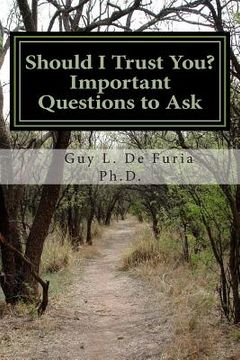Compartir
Should I Trust You?: Important questions to ask (en Inglés)
Guy L. De Furia Phd
(Autor)
·
Createspace Independent Publishing Platform
· Tapa Blanda
Should I Trust You?: Important questions to ask (en Inglés) - De Furia Phd, Guy L.
$ 26.410
$ 36.680
Ahorras: $ 10.270
Elige la lista en la que quieres agregar tu producto o crea una nueva lista
✓ Producto agregado correctamente a la lista de deseos.
Ir a Mis Listas
Origen: Estados Unidos
(Costos de importación incluídos en el precio)
Se enviará desde nuestra bodega entre el
Miércoles 07 de Agosto y el
Lunes 19 de Agosto.
Lo recibirás en cualquier lugar de Chile entre 1 y 3 días hábiles luego del envío.
Reseña del libro "Should I Trust You?: Important questions to ask (en Inglés)"
Every day, millions of people struggle with the doubts associated with hoped for benefits of reciprocated trust and the negative feelings and consequences of violated trust. The dynamics of trust are simple yet essentially not discussed among the people who need to know how it works and what happens when it doesn't work. The audience includes women especially young women, high school and college students plus relationship counseling professionals. Our society demonstrates on a daily basis that the dynamics of trust are not commonly understood nor managed very well. Because of this, the book should resonate in the marketplace. People will buy this little book because it stresses the reality of the potential harm Vs potential benefit of trusting another person in simple to understand language and because these are crucial to the question: Should I Trust You? Book is based on doctoral research and years of experience across a wide spectrum of interpersonal trust. Author has PhD in psychology; doctoral dissertation developed, validated and tested the first behavioral model of interpersonal trust. Experience includes twenty years of organization development consultant, trainer and facilitator of human relations interventions. Previous book: Facilitators' Guide to interpersonal Trust. Book uses a question and answer format so readers can locate the specific information that is of interest. It includes nine chapters: Interpersonal Trust, Building or Destroying Trust, Self-Trust, Trust within a Friendship, Trust in Marriage or Civil Union, Trust within the Family, Trust in Schools, Trust in the Work Setting, Trusting Strangers. The book includes a reader self-assessment questionnaire with which the reader identifies her/his propensity to build or hamper trust. Specific behaviors to improve trust are provided. Human relations professionals will use the book and questionnaire in training and counseling. Some of the questions answered in the book: What are the benefits and consequences of high or low trust respectively? Does trust affect a person's perception of reality? Do men and women differ in judging trustworthiness? Should the amount at risk affect your willingness to trust? How do you build trust with a person who demonstrates low trust? Are trust behaviors equal in their contribution to perceived trustworthiness? What behaviors are typical of a defensive person and what part does low trust play? Can violated trust be restored? What is self-trust? Where do my expectations of myself come from? What are the goals and expectations for trust in a friendship? How do men and women maintain trust? What are the signs of committed relationships high in trust - low in trust? What is the process of building and maintaining trust in committed relationships? Can parents with differing expectations (values, goals) be a problem in establishing familial trust? Do men and women differ in what they expect of other family members? What does trust in schools mean? How can schools foster teacher trust in students and students trust in teachers and authority figures? What are the benefits and consequences of high and low trust respectively upon organizational performance? How can managers build trust? How can managers recover from violated trust? Can you - should you trust strangers? How can I determine if I should trust a stranger? When does trusting strangers become dangerous? Book includes a questionnaire and scoring instructions from which the reader may compose a paragraph describing the reader's propensity to use the behaviors that build or hamper interpersonal trust.
- 0% (0)
- 0% (0)
- 0% (0)
- 0% (0)
- 0% (0)
Todos los libros de nuestro catálogo son Originales.
El libro está escrito en Inglés.
La encuadernación de esta edición es Tapa Blanda.
✓ Producto agregado correctamente al carro, Ir a Pagar.

